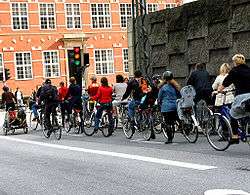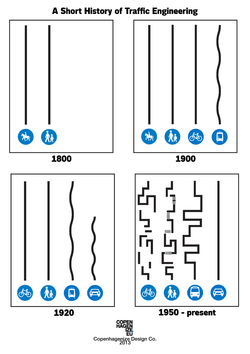Cycling advocacy
Cycling advocacy consists of activities that call for, promote or enable increased adoption and support for cycling and improved safety and convenience for cyclists, usually within urbanized areas or semi-urban regions. Issues of concern typically include policy, administrative and legal changes (the consideration of cycling in all governance); advocating and establishing better cycling infrastructure (including road and junction design and the creation, maintenance of bike lanes and separate bike paths, and bike parking); public education regarding the health, transportational and environmental benefits of cycling for both individuals and communities, cycling and motoring skills; and increasing public and political support for bicycling.[1]
There are many organisations worldwide whose primary mission is to advocate these goals. Most are non-profit organisations supported by donations, membership dues, and volunteers.[2][3]
Cycling advocacy around the world
Europe
Bicycle embassies
In Europe, Bicycle embassies have been set up to communicate established bodies of knowledge concerning cycling infrastructure, bicycle promotion and cycling advocacy techniques to other national, state and municipal governments.
Established bicycle embassies include, the Dutch Cycling Embassy, the Cycling Embassy of Denmark and the Cycling Embassy of Great Britain.
Copenhagenization


Copenhagenization is a design strategy in which urban planning and design are centered on making a city more accessible to bicyclists and pedestrians, and less car dependent.[4][5]
The term was popularised by Danish urban design consultant Jan Gehl,[6] who has been instrumental in the promotion and implementation of the policy in Copenhagen.
For more than 40 years, Mr. Gehl has systematically studied public spaces to see how they really work, using Strøget and Copenhagen as a laboratory for his research. He has advised cities around the world, including Melbourne, London and New York, on how to improve the quality of urban life -- in his words, how to "Copenhagenize" their cities.[7]
Independently of Gehl, Danish urban design consultant Mikael Colville-Andersen coined and popularized the phrase the term in this meaning to a broader audience, starting in 2007 with the Copenhagenize.com blog,[8] that highlights how the bicycle can be an important tool in the creation of liveable cities. The term has since spread to Britain, to Europe, and elsewhere internationally. The Copenhagenize.com blog has inspired the creation of other blogs with the same focus for cities such as Amsterdam, Portland, Lisbon, Hamburg and Munich.[9][10][11][12]
North America
In North America the term Bicycle Ambassador arose to describe cycling advocates tasked with promoting bicycling in a community. Such advocates can be employed by the national, provincial or city government and their tasks include networking extensively with other municipal offices whose activities effect cycling.
Early Bicycle Ambassador programs began in Toronto in the late 1990s. Other cities picked it up over the following decade, Chicago being the largest. Portland, Oregon, San Francisco, California, Seattle, Washington, Arlington, Virginia also have programs. Philadelphia, Washington, D.C. and New York City began programs most recently. Some programs are entirely youth focused, while others become a de facto part of the city Department of Transportation or other government agency.
Latin America
The World Bike Forum was organized in 2012 after the Critical Mass events in Porto Alegre in which an automobile driver deliberately collided and injured around 20 cyclists.[13] During the Forum bicycle-based urban mobility is discussed and strategies to spread the use of bicycles in the hosting city are promoted.
The Forum has taken place in the Southern Brazil cities of Porto Alegre (2012 and 2013) and Curitiba (2014). The 2015 edition will take place in the city of Medellín, Colombia.[14][15]
List of cycling advocacy groups and individuals
Among the world's best known cycling advocates are:
Major cycle advocacy groups include:
- European Cyclists' Federation, ECF, where most of the European national cyclists' federations and many worldwide are member
- Cycling Embassy of Denmark
- London Cycling Campaign, based in London (12,000 memberships, 2015[16])
- Bicycle Network, located in Australia and one of the largest cycling membership organisations in the world (45,000 members, 2015[17]).
See list of United States bicycle advocacy organizations
See also
- Bicycle culture
- Bicycle-friendly
- Bicycle law
- Bicycle transportation engineering
- Bicycle touring
- Community bicycle program
- Outline of cycling
Bicycle advocacy groups, movements and regional examples
- Bicycle Coalition of Greater Philadelphia
- Bike Delaware
- Bike Ottawa (Citizens for Safe Cycling), Ontario, Canada
- Critical Mass
- Cycling in Copenhagen
- Time's Up!
Films and other media
Bicycle advocacy in the developing world
Similar urban design concepts
References
- ↑ "SFBC Strategic Plan 2008-2012". San Francisco Bicycle Coalition. Retrieved 2011-05-06.
- ↑ "Join MassBike". Massachusetts Bicycle Coalition. Retrieved 2011-05-06.
- ↑ "Volunteer/Intern MassBike". Massachusetts Bicycle Coalition. Retrieved 2011-05-06.
- ↑ "On your bike: What the world can learn about cycling from Copenhagen". The Independent. London. 2009-10-18.
- ↑ "Bicycle-friendly Copenhagen a model for big cities". Reuters. 2009-12-14.
- ↑ A Danish Urban-Planning Guru vs. Moscow, New Yorker, Sally McGrane, 8 Oct 2012
- ↑ The Strøget Solution – Ottawa Citizen, Canada.com March 22, 2008
- ↑ Mikael Colville Andersen. "Copenhagenize.com - Bicycle Culture by Design: Copenhagenize Origins". copenhagenize.com. Retrieved 12 April 2015.
- ↑ "On your bike: What the world can learn about cycling from Copenhagen". The Independent. Retrieved 12 April 2015.
- ↑ Interview: 'EU must give cities strong tools for sustainable mobility' | EU – European Information on Transport & Services – EurActiv.com
- ↑ "COP15 Warm Up: Pedal Power to Light up the Christmas Tree". PR Newswire. Open Publishing. 2009-11-30. Retrieved 2009-07-06.
- ↑ Henriette Jacobsen (2009-12-14). "Bicycle-friendly Copenhagen a model for big cities". Reuters. Retrieved 2010-01-11.
- ↑ Scruggs, Greg. "A Critical Mass Tragedy Sparks a Bicycle Boom in Brazil". Next City. Retrieved 25 September 2014.
- ↑ Willian Cruz – Bike é Legal (February 17, 2014). "Medellín sediará Fórum Mundial da Bicicleta em 2015" (in Portuguese). Msn.com. Retrieved September 25, 2014.
- ↑ Carlos Cadena Gaitan (February 24, 2014). "Medellín, capital ciclista" (in Spanish). Elmundo.com. Retrieved September 25, 2014.
- ↑ "London Cycling Campaign". lcc.org.uk. Retrieved 12 April 2015.
- ↑ "Membership". bicyclenetwork.com.au. Retrieved 12 April 2015.
External links
- Copenhagenization in the Danish capital from CNN's 'Future Cities' series
- Jan Gehl's talk (in 4 parts plus introduction) on sustainable Urban Planning – part of the Royal Institute of British Architects' International Dialogues, Architecture and Climate Change series